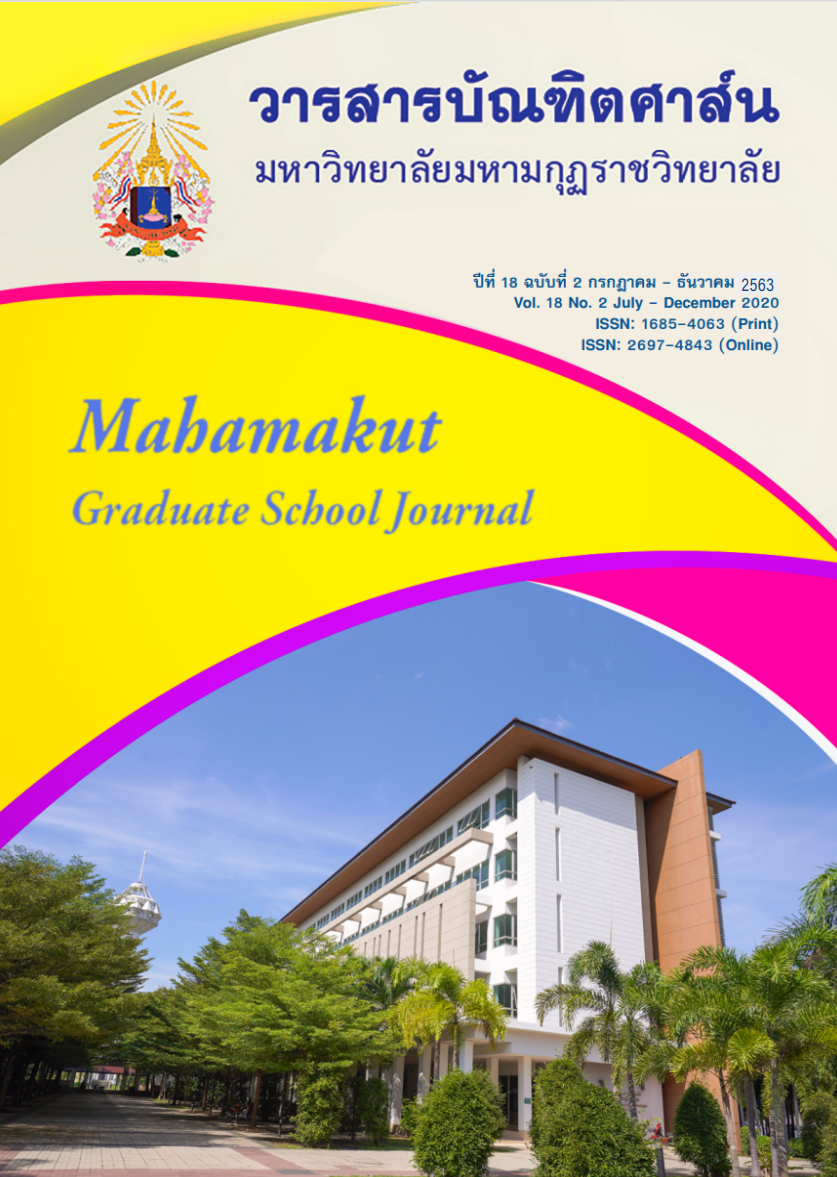ตัวบ่งชี้ภาวะผู้นำดิจิตอลของผู้บริหารสถานศึกษา สังกัดสำนักงานคณะกรรมการการศึกษาขั้นพื้นฐาน
คำสำคัญ:
ตัวบ่งชี้;, ภาวะผู้นำดิจิตอล;, ผู้บริหารสถานศึกษา;บทคัดย่อ
การวิจัยครั้งนี้ มีวัตถุประสงค์ 1) พัฒนาตัวบ่งชี้ภาวะผู้นำดิจิตอลของผู้บริหารสถานศึกษา สังกัดสำนักงานคณะกรรมการการศึกษาขั้นพื้นฐาน 2) ทดสอบความสอดคล้องกลมกลืนของโมเดลความสัมพันธ์เชิงโครงสร้างตัวบ่งชี้ ที่พัฒนาขึ้นกับข้อมูลเชิงประจักษ์ และ 3) ระบุองค์ประกอบ ตัวบ่งชี้ และพฤติกรรมบ่งชี้ ที่มีค่าความเที่ยงตรงเชิงโครงสร้าง หรือค่าน้ำหนักองค์ประกอบตามเกณฑ์ที่กำหนด ใช้วิธีการวิจัยเชิงปริมาณ กลุ่มตัวอย่างคือผู้บริหารสถานศึกษาขั้นพื้นฐาน จำนวน 640 คน เครื่องมือที่ใช้เป็นแบบสอบถามระดับการปฏิบัติ วิเคราะห์ข้อมูลหาค่าเฉลี่ย ส่วนเบี่ยงเบนมาตรฐาน ค่าสัมประสิทธิ์การกระจาย และการวิเคราะห์องค์ประกอบโดยใช้โปรแกรมคอมพิวเตอร์ทางสถิติ
ผลการวิจัยพบว่า
1) ตัวบ่งชี้ภาวะผู้นำดิจิตอลของผู้บริหารสถานศึกษา มี 12 ตัวบ่งชี้ 4 องค์ประกอบ ดังนี้คือ 1) องค์ประกอบความร่วมมือ 2) องค์ประกอบความรู้ดิจิตอลมี 3) องค์ประกอบวิสัยทัศน์ดิจิตอล และ 4) องค์ประกอบการสื่อสาร โดยมีพฤติกรรมบ่งชี้ที่ใช้ในการวิจัย 60 พฤติกรรมบ่งชี้ มีค่าเฉลี่ยสูงกว่า 3.00 และมีค่าสัมประสิทธิ์การกระจายเท่ากับ/น้อยกว่า 20 %
2) โมเดลมีความสอดคล้องกับข้อมูลเชิงประจักษ์ดีมาก
3) องค์ประกอบมีค่าน้ำหนักองค์ประกอบที่เป็นค่ามาตรฐานสูงกว่าเกณฑ์ 0.50 ทุกองค์ประกอบ ส่วนตัวบ่งชี้และพฤติกรรมบ่งชี้มีค่าน้ำหนักองค์ประกอบที่เป็นค่ามาตรฐานสูงกว่าเกณฑ์ 0.30 ทุกตัวบ่งชี้ และทุกพฤติกรรมบ่งชี้
เอกสารอ้างอิง
จุฬาลงกรณ์มหาวิทยาลัย.
ปิยวรรณ ปนิทานเต. (2559). มาช่วยกันขับเคลื่อน “เศรษฐกิจดิจิทัลกันเถอะ”. วารสาร
เทคโนโลยีวัสดุ ฉบับที่ 81.
วิโรจน์ สารรัตนะ. (2557). ภาวะผู้นำ ทฤษฎีและนานาทัศนะร่วมสมัยปัจจุบัน. กรุงเทพฯ:
ทิพยวิสุทธิ์.
สำนักงานคณะกรรมการข้าราชการพลเรือน. (2560). digital-literacy สืบค้นเมื่อ 5 ตุลาคม 2560,
จาก https://www.ocsc.go.th/tags/digital-literacy
เอกชัย กี่สุขพันธ์. (2559). การบริหารสถานศึกษายุคดิจิทัล (School Management in Digital
Era). สืบค้นเมื่อ 5 ธันวาคม 2559, จาก http://www.trueplookpanya.com/
Knowledge/content/52232/-edu-t2s1-t2-t2s3-
อติพร เกิดเรือง. (2560). การส่งเสริมการเรียนรู้ในศตวรรษที่ 21 เพื่อรองรับสังคมไทยในยุคดิจิทัล.
วารสารวิชาการ ฉบับที่6 No.1 มกราคม-มีนาคม 2561. มหาวิทยาลัยราชภัฎลำปาง.
อนุสรา อนุวงค์. (2558). Digital Economy สิ่งนี้สำคัญไฉน. ศูนย์บริหารวิชาการ คณะเศรษฐศาสตร์
มหาวิทยาลัยธรรมศาสตร์.
ดาวน์โหลด
เผยแพร่แล้ว
รูปแบบการอ้างอิง
ฉบับ
ประเภทบทความ
สัญญาอนุญาต
บทความวิชาการและบทความวิจัยในวารสารฉบับนี้ถือเป็นความรับผิดชอบของผู้เขียนเท่านั้น บทความที่ได้รับการตีพิมพ์ในวารสารบัณฑิตศาส์น ถือเป็นลิขสิทธิ์ของมหาวิทยาลัยมหามกุฏราชวิทยาลัย ตามพระราชบัญญัติลิขสิทธิ์



